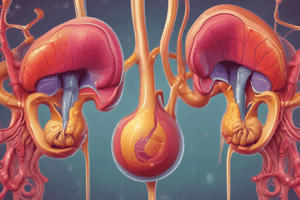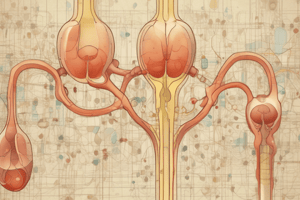Podcast
Questions and Answers
Explain the process of urine formation in the nephron.
Explain the process of urine formation in the nephron.
Urine formation involves ultrafiltration of blood in the glomerulus, followed by selective reabsorption and secretion of substances in the renal tubules.
What is the role of the glomerulus in urine formation?
What is the role of the glomerulus in urine formation?
The glomerulus filters the blood plasma to form an ultrafiltrate that enters the renal tubules.
Describe the function of the proximal convoluted tubule.
Describe the function of the proximal convoluted tubule.
The proximal convoluted tubule reabsorbs most of the water, glucose, amino acids, and other essential nutrients from the filtrate.
What is the role of the loop of Henle?
What is the role of the loop of Henle?
Explain the function of the collecting duct in urine formation.
Explain the function of the collecting duct in urine formation.
Flashcards are hidden until you start studying
Study Notes
Urinary System Physiology
- The urinary system is responsible for producing, storing, and eliminating urine from the body.
Structures of Urinary System
- Kidneys: filters waste and excess fluids from the blood, regulates electrolyte levels, and maintains acid-base balance.
- Ureters: muscular tubes that transport urine from kidneys to the bladder.
- Urinary Bladder: stores urine until it is eliminated from the body through the urethra.
- Urethra: a tube that carries urine from the bladder to the outside of the body.
Urine Formation
- Process of urine formation begins with filtration of blood in the kidneys.
- Filtration occurs in the glomerulus, a cluster of capillaries surrounded by Bowman's capsule.
- The filtrate then passes through the renal tubules, where water, electrolytes, and nutrients are reabsorbed into the bloodstream.
- The remaining waste and excess substances form urine, which collects in the renal pelvis and flows through the ureters to the bladder.
- The kidneys produce about 1-2 liters of urine per day in an average adult.
Note: Since the provided text is quite brief, the study notes are based on the general physiology of the urinary system. If more specific information is provided, the notes can be more detailed and focused.
Studying That Suits You
Use AI to generate personalized quizzes and flashcards to suit your learning preferences.




